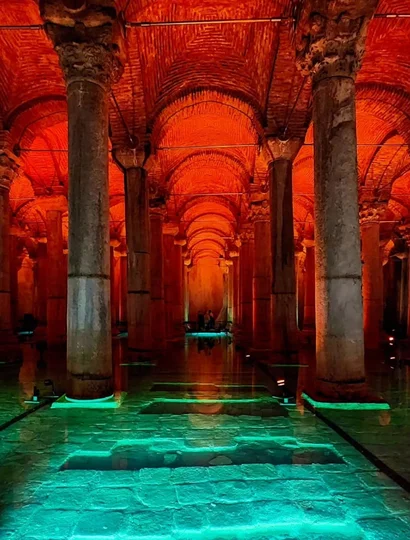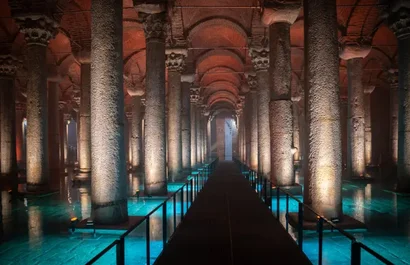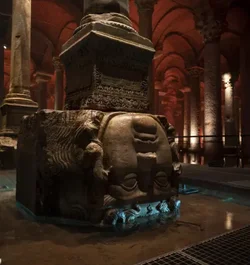About This Activity
Highlights
- Skip the long ticket lines and enter the mysterious Basilica Cistern with ease
- Get your QR code easily when you are in close proximity to the entrance of the Cistern
- Feel the past with the amazing architecture! In the construction of the cistern, more than 7000 people worked!
- Specially curated exclusive audio guide for you to learn all about the Cistern.
- Learn more about The Basilica Cistern which is the largest of hundreds of ancient cisterns that lie beneath Istanbul.
- Be amazed by its history with its charming historical and architectural structure, the Basilica Cistern is one of the best places to visit in Istanbul.
Included
- Entrance to Basilica Cistern Online Ticket
- Basilica Cistern Audio Guide in 25 Different Languages
The Basilica Cistern
The Basilica Cistern is the largest of several hundred ancient cisterns that lie beneath the city of Istanbul. Visit the Underground Palace (Yerebatan Sarnic), as it was known by the Ottomans, and experience the wonder of the vast cistern for yourself. You'll either feel transported back in time or onto the set of the blockbuster film "Inferno" as listening to your audio guide the history behind interesting features such as the Medusa head pillar bases. Bring on the adventure!
Get your online ticket easily when you arrive at the Cistern. Just Show&Go your online ticket and get into the amazing Basilica Cistern. Self-discover this incredible place by listening to the specially curated audio guide, exclusively prepared by your Pass! You can listen the audio guide in your own language with its 25 language options!
For this unique journey into Istanbul’s hidden past and much more, Buy Your Pass Now! Istanbul Tourist Pass® is here to make your Istanbul trip an unforgettable experience!
Times & Duration
Tour Times: 10:30, 13:30, 15,45 (except Fridays)
Meeting Point: Meet your guide at Dsign Cafe at least 15 minutes before the tour. Look for a white flag with the Istanbul Tourist Pass® and istanbul.com logos for easy recognition.
Where You'll Be
How to Get There?
Getting to the Basilica Cistern Guided Tour with Skip-the-Ticket-Line Entry is convenient and accessible from various parts of Istanbul. Here’s a guide to help you reach this iconic landmark:
Basilica Cistern is on Sultanahmet Square at the heart of the Old Town.
To get to Sultanahmet Square, take the T1 Bağcılar - Kabataş tram and get off at Sultanahmet station.
All About Basilica Cistern
This large underground cistern is built by the Byzantine Emperor Justinian (527-565) to solve the drinking water problem in the city. The Basilica Cistern was used for a while after the conquest of Istanbul by the Ottomans in 1453 and water was supplied to the gardens of Topkapı Palace, where the Sultans lived.
The water from the cistern was still water. That’s why it was not preferred by some of the Ottoman Sultan who liked to drink running water. After some water facilities were established in the city, the Cistern was completely forgotten until it was rediscovered by the Dutch traveler P. Gyllius who visited Istanbul to investigate the Byzantine ruins.
When the Cistern was unearthed, it was not in a condition to be used and required a massive renovation. The biggest renovation project during the Republican period was initiated by the Istanbul Municipality in 1985. With the removal of 50,000 tons of mud and the construction of the excursion platform, it was completed on September 9, 1987, and reopened to visitors.
The Basilica Cistern became one of the top tourist destinations since then. This place attracts millions of travelers each year due to its historical and impressive atmosphere. You can visit the Basilica Cistern with the Istanbul Tourist Pass® to skip the ticket lines and save time and money on your Istanbul trip.
Basilica Cistern Facts
In the construction of the cistern, more than 7000 people worked.
- After being designated as a museum, it’s been one of the best tourist attractions. Since then, Basilica Cistern has received a lot of attention from local and international visitors.
- Cistern’s famous visitors include former US President Bill Clinton, Dutch Prime Minister Wim Kok, former Italian Foreign Minister Lamberto Dini, former Swedish Prime Minister Göran Persson, and Austrian former Prime Minister Thomas Klestil.
The Architecture of Basilica Cistern
Basilica Cistern (Yetebatan Sarnici) is a huge building covering a rectangular area of 140 m in length and 70 m in width. It is descended by a 52-step stone staircase, having 336 columns, each 9 m in height. These columns, constructed at intervals of 4.80 meters from each other, form 28 rows of 12 in each row.
The columns rising in the water fascinate the visitors with their architecture as soon as they enter the cistern. The ceiling weight of the cistern was transferred to the columns by means of round cruciform vaults and arches. Most of the columns are understood to have been collected from older buildings and carved from the granite of various types of marble.
The headings of these columns have different features from place to place. While 98 of them reflect the Corinthian style, some of them belong to the Doric style.
The cistern is built of bricks, 4.80 m. thick walls and brick-tiled floor were plastered with a thick layer of Khorasan mortar and made watertight. This cistern has an area of 9800 m2 in total, and its water storage capacity is nearly 100,000 tons.
The impressive pillars are decorated with the repetitions of Peacock Eyes, Drooping Branch, and Teardrop shapes in carving and relief. According to popular rumors; the shapes that look like tears describe the hundreds of slaves who died during the construction of the Great Basilica. basilica cistern tour, cistern basilica Istanbul, basilica cistern tickets, basilica cistern opening hours, basilica cistern turkey, basilica cistern entrance fee, basilica cistern price, basilica cistern open, basilica cistern museum, the basilica cistern Istanbul, basilica cistern location, Istanbul basilica cistern opening hours.
After passing the middle part of the Cistern, it is about 40 m. inward from the southwest wall. A total of 40 columns, 9 columns in the longest part and 2 columns in the narrowest part, cannot be seen because they are behind these walls.
Medusa Heads In the Basilica Cistern
There are two Medusa Heads, located under the columns in the northwest corners of the Basilica Cistern and used as pedestals. These are among the most beautiful masterpieces of Roman period sculpture art. It is still a question mark today, where these structures were found and brought here.
There are still legends about the Head of Medusa. According to a rumor, Medusa is a woman who is always proud of her black eyes, long hair, and perfect body, and she is in love with Perseus, the son of Zeus. But it is known that Athena also fell in love with Perseus and was jealous of Medusa. Rumor indicates that Athena turned Medusa's hair into snakes. And on top of that, it is said that everyone who Medusa looks at turns into stone. That is why these Medusa Heads in the Basilica Cistern are placed upside-down to avoid its direct gaze.
Medusa, one of the three Gorgonas, in Greek Mythology, is the female monster of the underworld. Of these three sisters, only Medusa with the Snake Head is positive. At that time, it is thought that the paintings and sculptures of Gorgona's heads were placed in order to protect large structures. Medusa was placed here to protect this private place. These Medusa Heads are crucial for the Basilica Cistern which makes here one of the top travel spots to visit in İstanbul. Every tourist should add the Basilica Cistern to their Istanbul bucket list.
Know Before You Go
- The tour is led by a licensed English-speaking guide.
- You need an Internet connection on your smartphone to get your QR tickets.
- Children will be asked to present their valid passports at the entrance of the museums in order to validate their age. Children under 5 can enter the museum for free.
- The museum is closed for visits for half a day on the first day of Ramadan and Sacrifice Festivals.
- You cannot enter with a suitcase.
- You can buy your online ticket separately from the Istanbul Tourist Pass®.




.jpg)

.jpeg)

.jpeg)
.jpg)
.jpg)
.jpeg)
.jpg)












